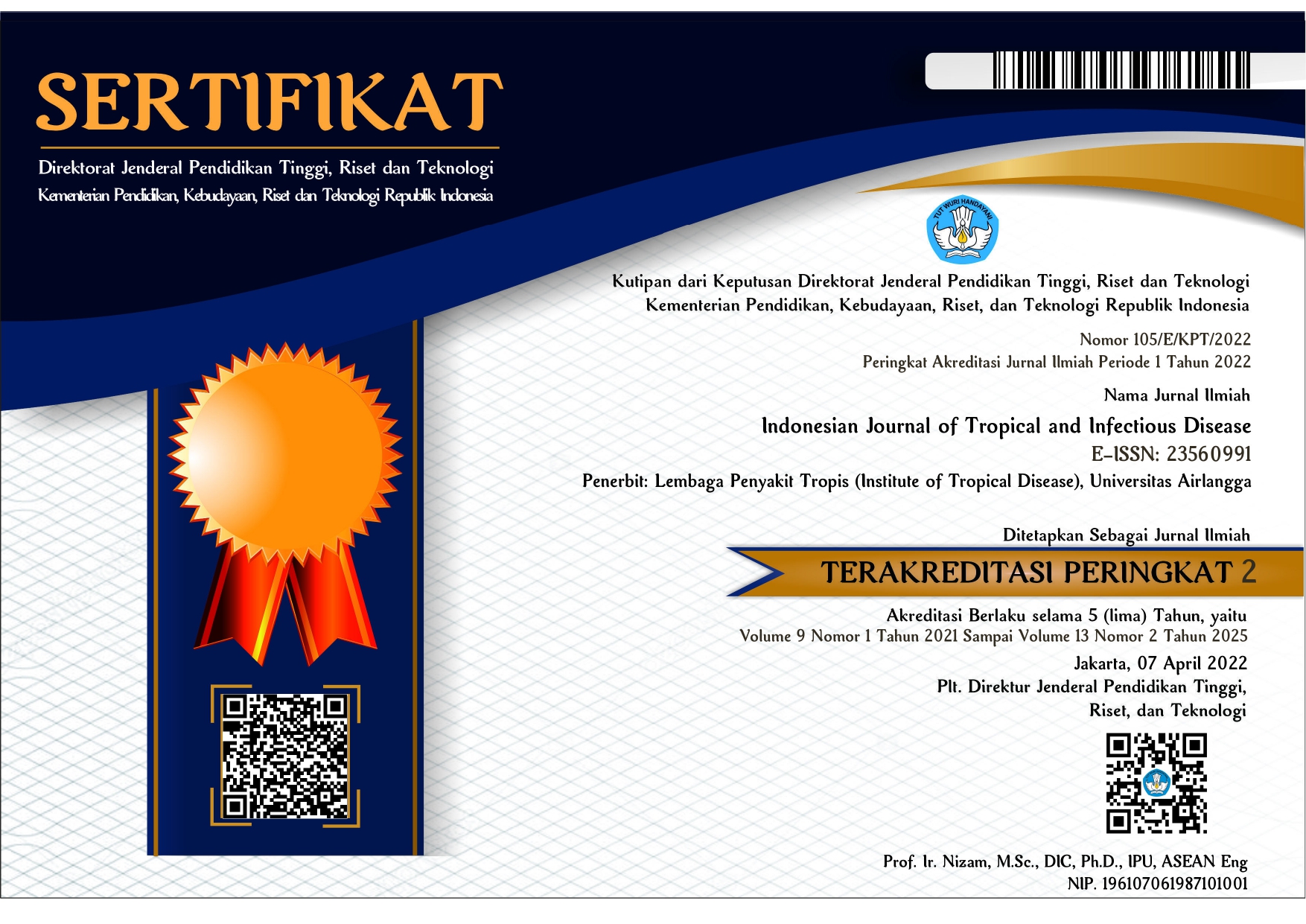RELATIONSHIP BETWEEN LEVEL OF SERUM ADIPONECTIN AND FRAILTY IN ELDERLY PATIENTS WITH CHRONIC OBSTRUCTIVE PULMONARY DISEASE
Downloads
Elderly are especially prone to the adverse health effects of chronic obstructive pulmonary disease (COPD). COPD is a typical aging disease which is found to be about 12% in the age group more than 64 years old. Frailty is an important geriatics syndrome, while adiponectin is an important adipokine that regulate homeostasis of energy. Adiponectin is affected by age, especially in males. Adiponectin levels increases as subcutaneous fat cells in older men decreases. Increased adiponectin can lead to muscle wasting which will further reduce body weight and body mass index (BMI), which indirectly also increases the degree of frailty. Until now the relationship between adiponectin with frailty degree in advanced COPD is still unknown.The aims of this study was to investigate the relationship between plasma adiponectin level and frailty in COPD elders. This was an observational analytic cross-sectional study. All anthropometric parameters, including weight, height, and body mass index (BMI), were measured. Adiponectin was measured by ELISA methods obtained from venous blood samples. Aged more than or equal to 60 years old, the patients underwent spirometry to determine the degree of airflow limitation and the degree of frailty defined by the Fried criteria. Statistic analysis used Rank Spearman. Thirty-eight male COPD patients became the subject of the study. The average age was 70-74 years, with a total of 13 robust, 12 prefrails and 13 frail patients. Level of adiponectin (mean and SD) in robust, prefrail, and frail were 6.84+ 2.66 , 6.58 + 4.27, and 11.62 + 4.90 respectively, p=0.015. Further analysis showed that level of adiponectin rose progresively with an increasing number of components of frailty. The degree of obstruction mostly with mild (42.1%), and no subjects with very severe. There were an increase in serum adiponectin levels in all subjects. In conclusion, level of adiponectin serum correlates positively with the degree of frailty.
Incalzi R, Scarlata S , Pennazza G, Santonico M & Pedon C, 2014. Chronic obstructive pulmonary disease in the elderly. European Journal of Internal Medicine; 25:320–328.
Kobayashi S, Yanai M, Hanagama M & Yamanda S, 2014. The burden of chronic obstructive pulmonary disease in the elderly population. Respiratory Investigation; 52: 296–301.
Tomoda K, Yoshikawa M,Takefumi Itoh T, Tamaki S, Fukuoka A Komeda K & Kimura H, 2007. Elevated circulating plasma adiponectin in underweight patients with COPD. CHEST; 132:135-140.
Park SK, Richardson CR, Holleman RG & Larson JL, 2013. Frailty in people with copd, using the national health and nutrition evaluation survey dataset (2003–2006). Heart & Lung: The Journal of Acute and Critical Care; 42: 163-170.
Brusik M, Ukropec J, Joppa P, Ukropcova B, Skyba P, Balaz M, Pobeha P, Kurdiova T, Klimes I, Tkac I, Gasperikova D & Tkacova R, 2012. Circulatory and adipose tissue leptin and adiponectin in relationship to resting energy expenditure in patients with chronic obstructive pulmonary disease. Physiological research: 469-480.
Wang ZV, Scherer PE, 2016. Adiponectin, the past two decades. J Mol Cell Biol. Apr;8(2):93-100. doi: 10.1093/jmcb/mjw011. Epub 2016 Mar 18.
Fried LP, Ferrucci L, Darer J, Williamson JD & Anderson G, 2004. Untangling the concepts of disability, frailty, and comorbidity: implications for improved targeting and care. The Journals of Gerontology. Series A, Biological Sciences and Medical Sciences; 59A: 255–263.
Lahousse L, Maes B, Ziere G, Loth DW, Verlinden VJA, Zillikens MC, Uitterlinden AG, Rivadeneira F, Tiemeier H, Franco OH, Ikram MA, Hofman A, Brusselle GG, Stricker BH, 2014. Adverse outcomes of frailty in the elderly: the Rotterdam Study. European Journal of Epidemiology; 29(6): 419-427.
Chan KH, Yeung SC, Yao TJ, Ip MS, Cheung AH, Chan-Yeung AH, Mak JC, and the COPD Study Group of the Hongkong Thoracic Society, 2010. Elevated plasma adiponectin levels in patients with chronic obstructive pulmonary disease. International Journal Of Tuberculosis And Lung Disease; 14: 1193-1200.
Tsai JS, Wu CH, Chen SC, Huang KC, Chen CY, Chang CI, Chuang LM & Chen CY. 2013. Plasma adiponectin levels correlate positively with an increasing number of components of frailty in male elders. Plos one; 1-8.
Huang C, Niu K & Momma H, 2014. Inverse association between circulating adiponectin levels and skeletal muscle strength in Japanese men and women. Nutrition, Metabolism & Cardiovascular Diseases; 24: 42-49.
Copyright (c) 2020 Indonesian Journal of Tropical and Infectious Disease

This work is licensed under a Creative Commons Attribution-NonCommercial-ShareAlike 4.0 International License.
The Indonesian Journal of Tropical and Infectious Disease (IJTID) is a scientific peer-reviewed journal freely available to be accessed, downloaded, and used for research. All articles published in the IJTID are licensed under the Creative Commons Attribution-NonCommercial-ShareAlike 4.0 International License, which is under the following terms:
Attribution ” You must give appropriate credit, link to the license, and indicate if changes were made. You may do so reasonably, but not in any way that suggests the licensor endorses you or your use.
NonCommercial ” You may not use the material for commercial purposes.
ShareAlike ” If you remix, transform, or build upon the material, you must distribute your contributions under the same license as the original.
No additional restrictions ” You may not apply legal terms or technological measures that legally restrict others from doing anything the license permits.























